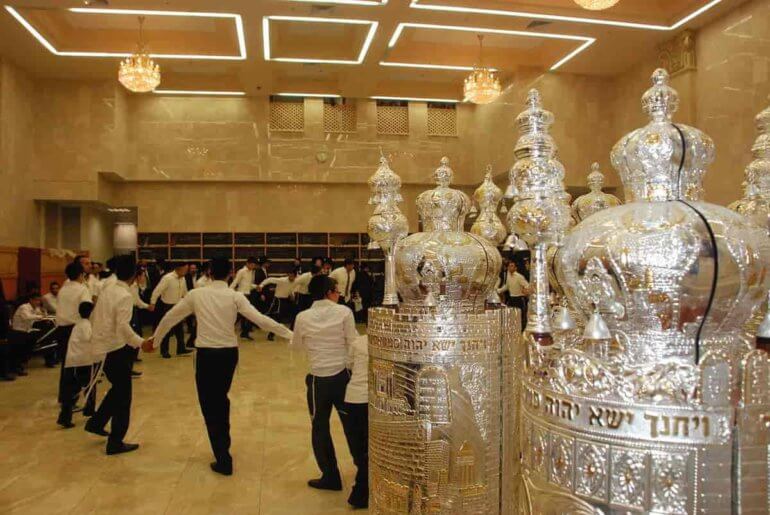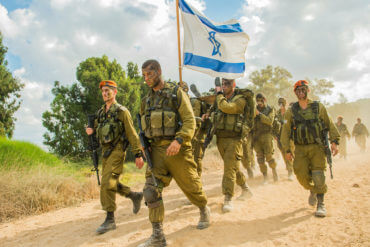
How Do We Handle Simchas Torah This Year?
Dear Jew In the City,
How do we handle Simchas Torah this year?
Thanks,
Arielle
_
Hi Arielle,
Thanks for your very interesting question. Before I address it, I’d like to contextualize things for those who may need the dots connected, as well as for people who may read this in the future and need the context of the question clarified for them.
The notorious October 7 attack of Hamas on Israel occurred on the holiday of Shemini Atzeres/Simchas Torah. In many Orthodox communities outside of Israel, unless a non-Jewish neighbor came over and shared the news, people were completely in the dark about the events in Israel until after the holiday was over and they started turning on their phones. That was in 2023, so this year (2024, when this is being written) is the first Simchas Torah since that infamous attack.
It’s not unreasonable that people are a little sensitive about Simchas Torah right now. I’ll share a story about that. In my “day job,” I run a program called Nach Yomi, which is a chapter of the Jewish Bible a day. For this program I have written a synopsis of every chapter in Nach (available free online or for cash money on Amazon), each with a theoretically clever title. One synopsis in the book of Isaiah bears the title “Happy Simchas Torah.” (It’s relevant to the chapter under discussion.) When this chapter came around recently, one woman complained that the title was insensitive given the events of October 7. Now, I wrote that synopsis more than a decade ago, so it didn’t even occur to me to edit it, but I must confess that I never would have actively named it that had I been writing it this year. I reached out to my boss to tap him for his opinion as to whether we should change it now for the next time it rolls around (which will be in 2026). We agreed that there’s a lot of time between now and then, and it’s impossible to predict what the sentiment will be in the future.
This situation reminds me of 9/11. I was at the World Trade Center on Sept. 11, 2001, standing closer to the towers than I should have been, taking pictures like a tourist. (The towers looked pretty sturdy and didn’t seem to be in any imminent danger of collapsing. Had I not decided to move along and try to get to my office, I would have had an even worse day, as many did.) Anyway, for a few years after, I was asked to speak on the anniversary of the World Trade Center attack. Now, not only am I not asked, if I volunteered my services, I’d probably be met with, “Why?” We still commemorate 9/11, but it’s no longer inconceivable that someone might, say, hold a party on that date. But in 2002 or 2003, it would have been seen as pretty insensitive. Similarly, I think that Simchas Torah will be a little sensitive for a few years, but eventually we’ll reach a point where it’s not so raw. We’ll still recognize the massacre, but it won’t consume us as much as it may for the first few years.
A colleague brought to my attention a campaign to get 1,500 shuls to use matching Torah covers for Simchas Torah, each embroidered with the name of a victim and the words עֵ֥ת סְפ֖וֹד וְעֵ֥ת רְקֽוֹד – “a time to eulogize and a time to dance.” These words from Koheles (3:4) remind us that life isn’t all mourning, nor is it all partying. Each of these has its place and we must strike an appropriate balance. I think that’s the key to answering your question, as well as to addressing life in general.
There are three stages to mourning. The most intense is the first seven days, which we call shiva. The next most intense is the thirty-day period called shloshim. Least intense – but still a mourning period – are the twelve months observed when mourning a parent. If yom tov falls during shiva, shiva is canceled and the mourner moves on to shloshim. If yom tov falls during shloshim, that’s canceled and the mourner moves on to the twelve months, if appropriate. Since yom tov abruptly truncates these mourning periods, it is clearly not a time for mourning itself. But that doesn’t mean we can’t honor the victims, commemorate their memories and/or celebrate their lives.
The Talmud in Pesachim (66a) discusses a year in which erev Pesach fell on Shabbos and the Torah authorities were at a loss as to how the people would get their knives (for sacrificing the Passover offering) to the Temple, carrying being prohibited on Shabbos. Hillel told them not to worry. Rather, they should watch the people because they would intuit what to do. Sure enough, that Shabbos, those who brought a goat for their offering stuck the knife between its horns, while those who brought a sheep stuck the knife in its wool. (When he saw this, Hillel recalled that that was in fact the law he had learned and forgotten.)
I think the same principle applies here. We can try to mandate what people should do, but we can never mandate how they’re going to feel. Some shuls may maximize the focus on the massacre, while others may limit it to a token announcement. It doesn’t matter; the people are ultimately going to set the tone. The first two or three Simchas Torahs may be more intense because of the freshness of the emotional wounds, but I believe that, eventually, we’ll organically settle into an appropriate way to address the conflicting natures of the day. Just watch the people and see what they do.
Sincerely,
Rabbi Jack Abramowitz
Educational Correspondent
Follow Ask Rabbi Jack on YouTube
If you found this content meaningful and want to help further our mission through our Keter, Makom, and Tikun branches, please consider becoming a Change Maker today.







